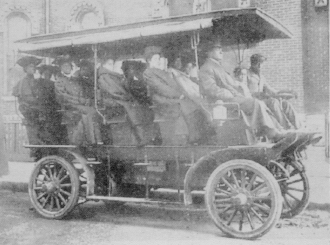Beginning in 1899, the Tennessee General Assembly attempted to expand the existing scope of segregation in public transit by proposing legislation to "make the separate coach law apply to street cars." Although this proposal died the same year in the House Judiciary Committee, it was revived in 1901 and was defeated by a 48-30 vote in the House of Representatives. Again, in the biennial session of 1903, proponents of the "separate coach" legislation continued to push for the law's enactment. Successful lobbying by the transit companies and strong newspaper objection in Nashville and Chattanooga aided in limiting the proposed law to "counties having 150,000 inhabitants." On June 7, 1903, the Tennessee Supreme Court ruled that the streetcar law was unconstitutional. However, white citizens of Tennessee mirrored the notion of ethics superiority, as revealed in the range of laws established to separate the Negro race from white society in other southern states.
When the General Assembly convened in January of 1905, Jim Crow was awakened from hibernation. On January 10, Davidson County's Representative Charles P. Fahey introduced Bill Number 87 "to separate white and colored passengers on streetcars." After two or three inconsequential amendments had been adopted, the bill, as amended, passed the lower house of the legislature by a vote of 81 to 4. It was then transmitted to the upper chamber, where it passed by a 28-1 vote. The law passed on March 30 was to become effective on July 5 and required operators of streetcars to designate by means of conspicuous signs which part of the car was for white or colored passengers. Those passengers refusing to occupy the designated seating area were liable for a fine not to exceed twenty-five dollars.
As early as March 5, 1904, the Reverend J. A. Jones declared that "the day the separate street car law goes into effect. . .that day the company will lose nine-tenths of its negro [sic] patronage. . .the self-respecting, intelligent colored citizens of Nashville will not stand for Jim Crowism on the streetcar lines in this city." The Nashville Clarion, a Negro weekly newspaper edited by the Reverend Edward W. D. Isaac, urged its readers "to buy buggies, or if they could not, trim their corns, darn their socks, wear solid shoes and walk." On July 5, black Nashvillians transformed
 disapproving
discourse into protest action and boycotted the Nashville Transit Company.
Whites accused Negro leaders of being "agitators. . .who for purposes
of their own are willing to play upon the fears and excite the prejudices
of their more ignorant people." A well - known black cleric responded
to the charge by insisting that the real troublemakers were the members
of the Tennessee General Assembly, who "substitute race prejudice
for brain." R. H. Boyd said, "These discriminations are only
blessings in disguise. They stimulate and encourage, rather than cower
and humiliate the true, ambitious, self-determined Negro."
disapproving
discourse into protest action and boycotted the Nashville Transit Company.
Whites accused Negro leaders of being "agitators. . .who for purposes
of their own are willing to play upon the fears and excite the prejudices
of their more ignorant people." A well - known black cleric responded
to the charge by insisting that the real troublemakers were the members
of the Tennessee General Assembly, who "substitute race prejudice
for brain." R. H. Boyd said, "These discriminations are only
blessings in disguise. They stimulate and encourage, rather than cower
and humiliate the true, ambitious, self-determined Negro."
Of all the boycotts that took place in the state, Nashville had the best-organized boycott and the most ambitious of transportation companies, which Negroes initiated in several southern municipalities. The Union Transportation Company was chartered August 29,1905, and became operational on October 3. As the company began experiencing difficulty with its steam-driven cars, electric-powered buses, and more and more blacks tired of walking, the boycott came to an end. The black streetcars were sold and the Union Transportation Company was closed in 1907.